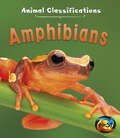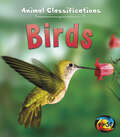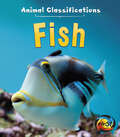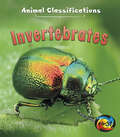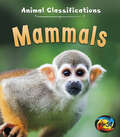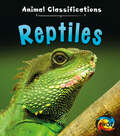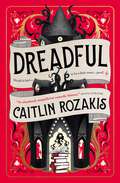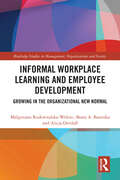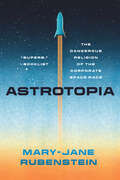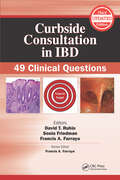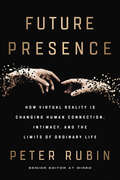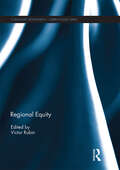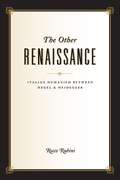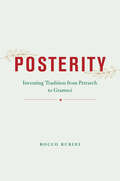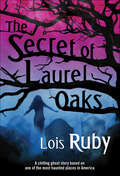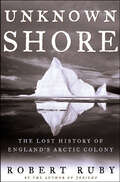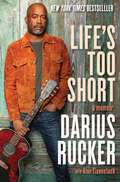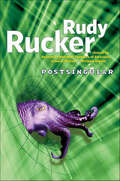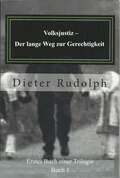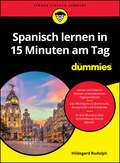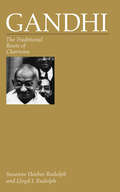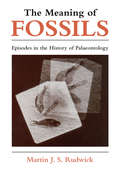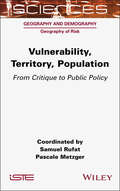- Table View
- List View
Amphibians (Animal Classifications Ser.)
by Angela RoystonThis book is all about amphibians: what they do, how they behave, and how these characteristics are different from other groups of animals. Beautifully illustrated with colorful photographs, the book shows many examples of different types of amphibians in their natural environment.
Birds (Animal Classifications Ser.)
by Angela RoystonThis book is all about birds: what they do, how they behave, and how these characteristics are different from other groups of animals. Beautifully illustrated with colorful photographs, the book shows many examples of different types of birds in their natural environment.
Fish (Animal Classifications Ser.)
by Angela RoystonThis book is about all fish: what they do, how they behave, and how these characteristics are different from other groups of animals. Beautifully illustrated with colorful photographs, the book shows many examples of different types of fish in their natural environment.
Invertebrates (Animal Classifications Ser.)
by Angela RoystonThis fascinating series takes a very simple look at animal classifications, with each book focussing on a different group of animal. This book is about invertebrates: what they do, how they behave, and how these characteristics are different from other groups of animals. Beautifully illustrated with colorful photographs, the book shows many examples of different types of invertebrates in their natural environment.
Mammals (Animal Classifications Ser.)
by Angela RoystonThis fascinating series takes a very simple look at animal classifications, with each book focussing on a different group of animal. This book is about mammals: what they do, how they behave, and how these characteristics are different from other groups of animals. Beautifully illustrated with colorful photographs, the book shows many examples of different types of mammals in their natural environment.
Reptiles (Animal Classifications Ser.)
by Angela RoystonThis fascinating series takes a very simple look at animal classifications, with each book focussing on a different group of animal. This book is about reptiles: what they do, how they behave, and how these characteristics are different from other groups of animals. Beautifully illustrated with colorful photographs, the book shows many examples of different types of reptiles in their natural environment.
Dreadful
by Caitlin RozakisA sharp-witted, debut high fantasy farce featuring killer moat squid, toxic masculinity, evil wizards and a garlic festival - all at once. Perfect for fans of T. Kingfisher, K. J. Parker and Travis Baldree.It&’s bad enough waking up in a half-destroyed evil wizard&’s workshop with no eyebrows, no memories, and no idea how long you have before the Dread Lord Whomever shows up to murder you horribly and then turn your skull into a goblet or something.It&’s a lot worse when you realize that Dread Lord Whomever is… you.Gav isn&’t really sure how he ended up with a castle full of goblins, or why he has a princess locked in a cell. All he can do is play along with his own evil plan in hopes of getting his memories back before he gets himself killed. But as he realizes that nothing – from the incredibly tasteless cloak adorned with flames to the aforementioned princess – is quite what it seems, Gav must face up to all the things the Dread Lord Gavrax has done. And he&’ll have to answer the hardest question of all – who does he want to be?A high fantasy farce featuring killer moat squid, toxic masculinity, an evil wizard convocation, and a garlic festival. All at once. All in all, Dread Lord Gavrax has had better weeks.
Informal Workplace Learning and Employee Development: Growing in the Organizational New Normal (Routledge Studies in Management, Organizations and Society)
by Malgorzata Rozkwitalska-Welenc Beata A. Basinska Alicja DettlaffThe new paradigm in employee development assumes that employees should proactively direct their learning and growth. Most workplace learning is basically informal and occurs through daily work routines, peer-to-peer interactions, networking, and typically brings about significant positive outcomes to both individuals and organizations. Yet, workplace learning always occurs in a pre-defined context and this context has recently changed, and hereafter many people have been delegated to work from home or any other remote locations. Many employees would like to maintain remote or hybrid work design in the future, as well. In this research monograph, the authors explore an unexplored topic in social science research concerning proactive employee development through informal learning in new ways of working (NWW). The authors are esteemed experts in organizational studies, organizational psychology, and human resource management. The monograph will be of interest to students and researchers in organizational studies, organizational behavior, organizational psychology and organizational learning, as well as human resource professionals concerned with employee development and the changing nature of work.
Japan’s Rise as a Regional and Global Power, 2013-2023: A Momentous Decade (Routledge Studies on the Asia-Pacific Region)
by Gilbert Rozman Brad GlossermanRozman and Glosserman follow a momentous decade in the transformation of Japanese foreign policy from 2013 to 2023 that unveils Japan in a new light as a leading power more closely aligned with the United States than ever before but with distinct aspirations.The book presents a comprehensive chronology, a broad sweep of relations with regional partners, and an unprecedented look at new relations with Europe. Zeroing in on the legacy of Abe Shinzo, it pays special attention to the leadership of Kishida Fumio in response to the Biden administration, the Ukraine war, the growing alarm about China, the swings in ties to South Korea, and the hopes to be a bridge with Southeast Asia and India.It is a vital read for students of international relations in the Indo-Pacific and of Japan and advanced undergraduate courses on Japanese foreign policy, Asian regional studies and comparative international.
Astrotopia: The Dangerous Religion of the Corporate Space Race
by Mary-Jane RubensteinA revealing look at the parallel mythologies behind the colonization of Earth and space—and a bold vision for a more equitable, responsible future both on and beyond our planet. As environmental, political, and public health crises multiply on Earth, we are also at the dawn of a new space race in which governments team up with celebrity billionaires to exploit the cosmos for human gain. The best-known of these pioneers are selling different visions of the future: while Elon Musk and SpaceX seek to establish a human presence on Mars, Jeff Bezos and Blue Origin work toward moving millions of earthlings into rotating near-Earth habitats. Despite these distinctions, these two billionaires share a core utopian project: the salvation of humanity through the exploitation of space. In Astrotopia, philosopher of science and religion Mary-Jane Rubenstein pulls back the curtain on the not-so-new myths these space barons are peddling, like growth without limit, energy without guilt, and salvation in a brand-new world. As Rubenstein reveals, we have already seen the destructive effects of this frontier zealotry in the centuries-long history of European colonialism. Much like the imperial project on Earth, this renewed effort to conquer space is presented as a religious calling: in the face of a coming apocalypse, some very wealthy messiahs are offering an other-worldly escape to a chosen few. But Rubenstein does more than expose the values of capitalist technoscience as the product of bad mythologies. She offers a vision of exploring space without reproducing the atrocities of earthly colonialism, encouraging us to find and even make stories that put cosmic caretaking over profiteering.
Curbside Consultation in IBD: 49 Clinical Questions (Curbside Consultation in Gastroenterology)
by David T. Rubin Sonia Friedman Francis A. FarrayeNewly updated with the latest information on inflammatory bowel disease, Curbside Consultation in IBD: 49 Clinical Questions, Third Edition contains brief, practical, and evidence-based answers to the most frequently asked questions that are posed during a “curbside consultation” between surgical colleagues. Drs. David T. Rubin, Sonia Friedman, and Francis A. Farraye are joined by an expert group of contributors, offering advice, preferences, and opinions on tough clinical questions commonly associated with IBD. With a unique Q&A format, this text provides quick access to current information. Numerous images, diagrams, and references are included to better illustrate IBD.Some of the questions answered inside the Third Edition include: What are the new approaches to using and minimizing steroids? What is the evolving role of calcineurin inhibitors in IBD? Where should anti-IL-23 therapy be placed in the therapeutic algorithm for Crohn’s disease and ulcerative colitis? What should the clinicians and patients know about biosimilars? What are JAK inhibitors? And when should they be used in IBD? What is the approach to loss of response to biological therapy? How should we screen our patients with IBD for depression and anxiety? With information basic enough for trainees and expert practical advice that even high-volume clinicians will appreciate, Curbside Consultation in IBD: 49 Clinical Questions, Third Edition is a must-have. Gastroenterologists, surgeons, IBD nurses and advanced practice providers, and medical and surgical trainees at all levels will benefit from the user-friendly format and up-to-date advice for complicated cases.
Future Presence: How Virtual Reality Is Changing Human Connection, Intimacy, and the Limits of Ordinary Life
by Peter RubinA Wired senior editor and virtual reality expert presents a captivating, candid glimpse into the future "realities" of this emerging technology: how we will use it to form previously impossible relationships, explore new frontiers of intimacy, and how it will forever change human connection.Heralded as the most significant technological innovation since the smartphone, virtual reality is poised to transform our very notions of life and humanity. Though this tech is still in its infancy, to those on the inside, it is the future. VR will change how we work, how we experience entertainment, how we feel pleasure and other emotions, how we see ourselves, and most importantly, how we relate to each other in the real world. And we will never be the same.Peter Rubin, senior culture editor for Wired and the industry’s go-to authority on the subject, calls it an "intimacy engine." While once we needed another person to feel the sensations of closeness, trust, vulnerability, confidence, and titillation, VR will give us the ability to induce these sensations by ourselves for the first time in human history. This metamorphosis, Rubin argues, is going to have a powerful impact on relationships that will ripple throughout our society and our individual lives.A journey into this uncertain future and a glimpse at the cultural implications and promises of a new reality, Future Presence explores a host of complex questions about what makes us human, what connects us, and what is real. Offering a glimpse into the mind-blowing things happening in universities, labs, and tech companies around the world, Rubin leads readers on an entertaining tour of the weirdest, wildest corners of this fascinating new universe. Describing this book as "half travelogue and half crystal ball", Rubin will:Introduce readers to the creators and consumers of VR technologyShow readers what an experience is like inside the current VR devicesExplain how this technology will upend everything we know about human connection in the futureAt once the incredible, inevitable story of virtual reality’s rise and a look towards the future of our fantasies, Future Presence is a deeply personal examination of what connects us, and an analysis of what relationships, empathy, and sex could look like—sooner than we think.
Regional Equity (Community Development – Current Issues Series)
by Victor RubinRegional equity as a field of scholarship, as an arena of policy change, and as a social movement has grown, diversified, and matured in important ways over the past decade. The fruits of that growth and development can be seen in recent federal and state policies, in the practices of many regional planning organizations, and in the agendas and approaches of countless community-based organizations and issue advocacy groups.As the field has expanded, a growing number of researchers have been tracking these phenomena: explaining how and why concepts of metropolitan development are being reframed; documenting the efforts to shape policies and diversify leadership; assessing where and how equity and social justice concerns have been brought into regional planning for transportation, land use, housing, public finances, environmental quality, smart growth, sustainable development, public health and other issue areas. This volume brings together analyses and commentary by some of the leading scholarly observers these timely developments.This book was published as a special issue of Community Development.
The Other Renaissance: Italian Humanism between Hegel & Heidegger
by Rocco RubiniA natural heir of the Renaissance and once tightly conjoined to its study, continental philosophy broke from Renaissance studies around the time of World War II. In The Other Renaissance, Rocco Rubini achieves what many have attempted to do since: bring them back together. Telling the story of modern Italian philosophy through the lens of Renaissance scholarship, he recovers a strand of philosophic history that sought to reactivate the humanist ideals of the Renaissance, even as philosophy elsewhere progressed toward decidedly antihumanist sentiments. Bookended by Giambattista Vico and Antonio Gramsci, this strand of Renaissance-influenced philosophy rose in reaction to the major revolutions of the time in Italy, such as national unity, fascism, and democracy. Exploring the ways its thinkers critically assimilated the thought of their northern counterparts, Rubini uncovers new possibilities in our intellectual history: that antihumanism could have been forestalled, and that our postmodern condition could have been entirely different. In doing so, he offers an important new way of thinking about the origins of modernity, one that renews a trust in human dignity and the Western legacy as a whole.
Posterity: Inventing Tradition from Petrarch to Gramsci
by Rocco RubiniReading a range of Italian works, Rubini considers the active transmittal of traditions through generations of writers and thinkers. Rocco Rubini studies the motives and literary forms in the making of a “tradition,” not understood narrowly, as the conservative, stubborn preservation of received conventions, values, and institutions, but instead as the deliberate effort on the part of writers to transmit a reformulated past across generations. Leveraging Italian thinkers from Petrarch to Gramsci, with stops at prominent humanists in between—including Giambattista Vico, Carlo Goldoni, Francesco De Sanctis, and Benedetto Croce—Rubini gives us an innovative lens through which to view an Italian intellectual tradition that is at once premodern and modern, a legacy that does not depend on a date or a single masterpiece, but instead requires the reader to parse an expanse of writings to uncover deeper transhistorical continuities that span six hundred years. Whether reading work from the fourteenth century, or from the 1930s, Rubini elucidates the interplay of creation and the reception underlying the enactment of tradition, the practice of retrieving and conserving, and the revivification of shared themes and intentions that connect thinkers across time. Building on his award-winning book, The Other Renaissance, this will prove a valuable contribution for intellectual historians, literary scholars, and those invested in the continuing humanist legacy.
The Secret of Laurel Oaks
by Lois RubyA haunting historical mystery based on real life events, told in the alternating points of view of a contemporary girl and a 19th century slave accused of a horrible crime. When Lila and her family visit Laurel Oaks Plantation in Louisiana, her parents and brother scoff at the claim that the house is haunted. But secretly, Lila suspects there are ghostly presences willing to communicate with her, and her alone. One spirit eager to tell her story is Daphne, a slave girl at Laurel Oaks in the 1840s, who was blamed for the poisoning deaths of two girls and their mother. Daphne's spirit senses that Lila is the very person she's been waiting for, the one who can prove her innocence so her spirit can rest at long last. Shifting back and forth from Lila's world in the present to Daphne's world in the past, the true story of what really happened that fateful night finally comes to light. Laurel Oaks is a thinly disguised version of the legendary Myrtles Plantation in Louisiana, which is on the Smithsonian's list of the ten most haunted places in America. This middle grade novel was inspired by the author's visit to the plantation and her experiences there.At the Publisher's request, this title is being sold without Digital Rights Management Software (DRM) applied.
Unknown Shore: The Lost History of England's Arctic Colony
by Robert RubyThe true story of how the first English colony in the New World was lost to history, then found again three hundred years later.England's first attempt at colonizing the New World was not at Roanoke or Jamestown, but on a mostly frozen small island in the Canadian Arctic. Queen Elizabeth I called that place Meta Incognita -- the Unknown Shore. Backed by Elizabeth I and her key advisors, including the legendary spymaster Sir Francis Walsingham and the shadowy Dr. John Dee, the erstwhile pirate Sir Martin Frobisher set out three times across the North Atlantic, in the process leading what is still the largest Arctic expedition in history. In this forbidding place, Frobisher believed he had discovered vast quantities of gold, the fabled Northwest Passage to the riches of Cathay, and a suitable place for a year-round colony. But Frobisher's dream turned into a nightmare, and his colony was lost to history for nearly three centuries.In this brilliantly conceived dual narrative, Robert Ruby interweaves Frobisher's saga with that of the nineteenth-century American Charles Francis Hall, whose explorations of this same landscape enabled him to hear the oral history of the Inuit, passed down through generations. It was these stories that unlocked the mystery of Frobisher's lost colony.Unknown Shore is the story of two men's travels, and of what these men shared three centuries apart. Ultimately, it is a tale of men driven by greed and ambition, of the hard labor of exploration, of the Inuit and their land, and of great gambles gone wrong.
When i was in class 10th
by RuchikaRuchika, an introvert who finds solace in writing, began expressing her innermost thoughts through poetry at the age of fourteen. Her diary, once her sanctuary, now unfolds its secrets to the world in this captivating collection. A dedicated educator since 2003, Ruchika holds a Master's degree in Child Care and Education from Alagappa University and a Bachelor's in Elementary Education from JMC, Delhi. Her passion for teaching brings joy to her students, and she feels blessed to nurture young minds. With heartfelt gratitude to Shrija Publishers for bringing her youthful musings to life, Ruchika invites readers to explore the intimate realm of her poetic journey.
Life's Too Short: A Memoir
by Darius RuckerA raw, heartfelt memoir from Darius Rucker, the Grammy Award– winning country music sensation and multiplatinum-selling lead singer of Hootie & The Blowfish <P><P> In 1986 Darius Rucker cofounded Hootie & The Blowfish at the University of South Carolina. What began as a party band playing frat houses and dive bars quickly became a global pop rock phenomenon through their multiplatinum-selling debut album, cracked rear view, which featured era-defining hit songs like “Only Wanna Be with You,” “Let Her Cry,” and “Hold My Hand.” Later, Darius would chart a pioneering path as a solo country music artist, with classic anthems like “Wagon Wheel” and “Alright.” <P><P> Nearly forty years after the band’s formation, Darius tells his remarkable story through the lens of the songs that shaped him—from Al Green, Stevie Wonder, and KISS to Lou Reed, Billy Joel, Nanci Griffith, and so many more. <P><P> Set against the soundtrack of his life, Darius recounts his childhood as the son of a single mother in Charleston, South Carolina. He traces the unlikely ascent of his band and shares wild tales of life on the road—but he also faces his missteps, defeats, and demons. As moving as it is entertaining, Life’s Too Short is a timeless book about a man and his music. <p> <b>New York Times Bestseller</b>
Postsingular (Postsingular Ser. #1)
by Rudy RuckerIt all begins next year in California. A maladjusted computer industry billionaire and a somewhat crazy US President initiate a radical transformation of the world through sentient nanotechnology; sort of the equivalent of biological artificial intelligence. At first they succeed, but their plans are reversed by Chu, an autistic boy. The next time it isn't so easy to stop them. Most of the story takes place in a world after a heretofore unimaginable transformation, where all the things look the same but all the people are different (they're able to read each others' minds, for starters). Travel to and from other nearby worlds in the quantum universe is possible, so now our world is visited by giant humanoids from another quantum universe, and some of them mean to tidy up the mess we've made. Or maybe just run things.At the Publisher's request, this title is being sold without Digital Rights Management Software (DRM) applied.
Volksjustiz - Der lange Weg zur Gerechtigkeit (Book one of a Trilogy #1)
by Dieter RudolphDie fortlaufende Geschichte eines Mörders, der weiterhin die Welt von Menschen befreien will, die als unerwünscht gelten, weil sie Sünden begangen haben, die nicht vergeben werden sollten; sein Ziel sind verurteilte Pädophile! Nach Ansicht unseres Mörders sind einige Jahre im Gefängnis, oft im offenen Vollzug - was manche als luxuriöses Leben bezeichnen - keine ausreichende Strafe. Er plant die Morde genau so, dass die Justiz keinen Anhaltspunkt und kaum Ideen hat, wie die Mordserie beendet werden kann. Und diesem Ziel räumt sie absolute Priorität ein. Der Fall ist für die Polizei in doppelter Hinsicht frustrierend, da der Mörder von der Bevölkerung als Richter der Menschheit gefeiert wird. Die Liste der Kandidaten, denen "Volksjustiz" widerfahren soll, scheint endlos zu sein.
Spanisch lernen in 15 Minuten am Tag für Dummies (Für Dummies)
by Hildegard RudolphNur ein Viertelstündchen Spanisch am Tag Sie wollen Spanisch lernen, ohne stundenlang Vokabeln und Grammatik zu pauken? Dann ist dieses Buch genau das Richtige für Sie! In auf 15 Minuten pro Tag begrenzten Lektionen bringt es Ihnen die spanische Sprache näher. So erfahren Sie im Handumdrehen alles Wichtige über Grammatik und Aussprache und erweitern Ihren Wortschatz. Mit regelmäßigen Wiederholungsfragen können Sie Ihr Wissen testen. Zum Download verfügbares Audiomaterial rundet die Lektionen ab. So werden Sie, wenn Sie nach drei Monaten das Buch durchgearbeitet haben, in der Lage sein, sich auf Spanisch zu verständigen. Sie erfahren Wie Sie in jeder Situation die richtigen Worte finden Mit welchen Redewendungen Sie brillieren Welche Wörter Sie nicht verwechseln sollten Wie Sie das Spanische richtig aussprechen
Gandhi: The Traditional Roots of Charisma
by Susanne Hoeber Rudolph Lloyd I. RudolphThe Rudolphs' analysis reveals that Gandhi's charisma was deeply rooted in the aspects of Indian tradition that he interpreted for his time. They key to his political influence was his ability to realize in both his daily life and his public actions, cultural ideals that many Indians honored but could not enact themselves—ideals such as the traditional Hindu belief that a person's capacity for self-control enhances his capacity to control his environment. Appealing to shared expectations and recognitions, Gandhi was able to revitalize tradition while simultaneously breaking with some of its entrenched values, practices, and interests. One result was a self-critical, ethical, and inclusive nationalist movement that eventually led to independence.
The Meaning of Fossils: Episodes in the History of Palaeontology
by Martin J.S. Rudwick"It is not often that a work can literally rewrite a person's view of a subject. And this is exactly what Rudwick's book should do for many paleontologists' view of the history of their own field."—Stephen J. Gould, Paleobotany and Palynology "Rudwick has not merely written the first book-length history of palaeontology in the English language; he has written a very intelligent one. . . . His accounts of sources are rounded and organic: he treats the structure of arguments as Cuvier handled fossil bones."—Roy S. Porter, History of Science
Vulnerability, Territory, Population: From Critique to Public Policy
by Samuel Rufat Pascale MetzgerDuring the Covid-19 pandemic, the term "vulnerable" was applied to "individuals" and to "populations", "groups" and "countries" in discussions, laws and regulations; now it applies to all objects in relation to all kinds of threats. However, rather than a label for governing people and places, the notion of "vulnerability" was expected to become an instrument to tackle the root causes of disasters, poverty and maldevelopment, as well as the inequalities and injustices they bring, whether social, political, economic or environmental. Despite this radical dimension, vulnerability has gradually been incorporated into public policies and international recommendations for global risk and disaster management. This book is intended for researchers, students, managers and decision makers concerned with the management of not only risks and crises but also climate and environmental change. The first part examines the multiple theoretical and conceptual approaches; the second explores vulnerability assessments, using examples from the Global North and Global South; and the third discusses tools, public policies and actions taken to reduce vulnerability.
